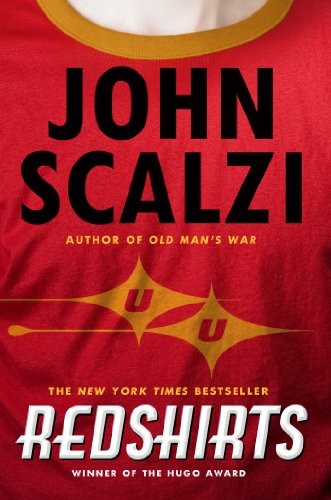Maxim reviewed Redshirts: A Novel with Three Codas by John Scalzi
Postmodernism at its finest
4 stars
An excellent piece of postmodern literature, with a good share of self-irony without which postmodern can't exist.

Paperback, 320 pages
Published Jan. 15, 2013 by Tor Books.
Ensign Andrew Dahl has just been assigned to the Universal Union Capital Ship Intrepid, flagship of the Universal Union since the year 2456. It's a prestige posting, with the chance to serve on "Away Missions" alongside the starship's famous senior officers.
Life couldn't be better...until Andrew begins to realize that 1) every Away Mission involves a lethal confrontation with alien forces, 2) the ship's senior officers always survive these confrontations, and 3) sadly, at least one low-ranking crew member is invariably killed. Unsurprisingly, the savvier crew members below decks avoid Away Missions at all costs.
Then Andrew stumbles on information that transforms his and his colleagues' understanding of what the starship Intrepid really is...and offers them a crazy, high-risk chance to save their own lives. Redshirts by John Scalzi is the winner of the 2013 Hugo Award for Best Novel.
An excellent piece of postmodern literature, with a good share of self-irony without which postmodern can't exist.
I felt the need for a little Scalzi snark and this is the snarkiest of his novels. It delivered on that in spades along with the entertainment. I inhaled this in one sitting, and there were definite snorts and giggles as I went through it. Yes, its only 4 stars on the top line but that's because a reader needs to be in on the joke. You have to be into Star Trek etc for any of this to make sense. Quality Scalzi, can recommend.
John Scalzi's dialog crackles with quick banter that makes his books worth reading:
Corey looked down and furrowed his brow. "Where are my pants?" he said. "We took them from you," Dahl said. "Why?" Corey said. "Because we need to talk to you," Dahl said. "You could do that without taking my pants," Corey said. "In a perfect world, yes," Dahl said.
-- John Scalzi, "Redshirts"
The only other Scalzi book I've read, Kiaju Preservation Society, let me down on plot—even when you remove the expected suspension of disbelief required of all sci-fi.
Fortunately, this book's plot holds up throughout the narrative.
The plot falls right out from the title. Think back to season one of "Star Trek: The Next Generation"—when the show was terrible. Think about all the nameless crew members who died on away missions. All those people had lives and families and worries. And their sad fate …
John Scalzi's dialog crackles with quick banter that makes his books worth reading:
Corey looked down and furrowed his brow. "Where are my pants?" he said. "We took them from you," Dahl said. "Why?" Corey said. "Because we need to talk to you," Dahl said. "You could do that without taking my pants," Corey said. "In a perfect world, yes," Dahl said.
-- John Scalzi, "Redshirts"
The only other Scalzi book I've read, Kiaju Preservation Society, let me down on plot—even when you remove the expected suspension of disbelief required of all sci-fi.
Fortunately, this book's plot holds up throughout the narrative.
The plot falls right out from the title. Think back to season one of "Star Trek: The Next Generation"—when the show was terrible. Think about all the nameless crew members who died on away missions. All those people had lives and families and worries. And their sad fate was to be devoured by Borgovian land worms. Now imagine those people get wise to the narrative, and you can piece together most of the plot from there.
I enjoyed the irony that the twist of this novel could ALSO be a throw-away episode of Star Trek. And that Wil Wheaton narrates the audiobook—Ensign Crusher in the flesh.
But this novel is funny, heartening, and lovable in the same way as my previous encounter with Scalzi. Plus it won the Hugo award for best novel back in 2013.
The codas were wonderful thought experiments. Imagine reckoning with all the characters you wrote into sloppy deaths. Or owing your life to a fictional version of yourself. Or living a more meaningful life as a fictional character who wouldn't exist except for you.
The idea of inadvertently spawning a fictional version of myself left me thinking of the lines from Whitman:
What I assume, you shall assume, for every atom belonging to me as good belongs to you.
-- Walt Whitman, "Song of Myself"
I enjoyed this novel. The dialog sparkles, the characters are sympathetic, and the plot is fun and serviceable.
And it gave me a writing gem to take home: you're the general for the army of characters you create.
Sooner or later the Narrative will come for each of us. It'll use us however it wants to use us. And then we'll die from it.
-- John Scalzi, "Redshirts"
Everyone dies. Your characters, if they're mortal, will die. And they may even die in your narrative. But you should never send them into a stupid situation to let them die from a blunder or for a cheap thrill.
If your characters must die, you owe them a good death, at least.